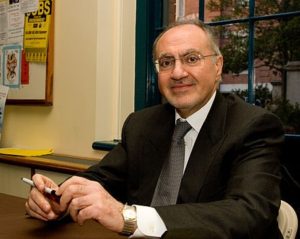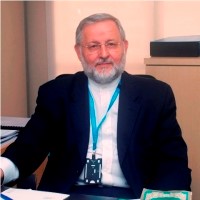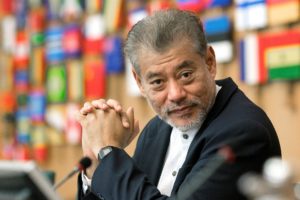Skip to content
The Foundation’s Advisory Board will guide the foundation towards achieving its mission to build effective institutions and sustain reform in Muslim countries. The Advisory Board is in the process of formation. We hope eventually to establish a Board of 12-15 eminent women and men, with diverse professional and regional backgrounds, to afford the Foundation and the Islamicity Project a broad perspective on the process of institution building and reform across the Muslim World. Because we may eventually merge the Foundation into a world-class university, we plan to keep a number of these board membership positions open to invite a few distinguished alumni of the partner university to join the Board. We are indeed honored to announce the three initial members of the Advisory Board:
Dr. Ali Allawi
 Ali A. Allawi was born in Iraq and educated in England and the United States where he earned a BS in civil engineering from MIT in 1968 and an MBA from Harvard University in 1971. Dr. Allawi was a leader in the Iraqi exile community in London during the rule of Saddam Hussein and lives in London and Baghdad. Allawi has enjoyed four distinct careers. As a businessman, he was a highly successful merchant banker in London. As an academic, he was a professor at Oxford University, a senior visiting fellow at Princeton University and research professor at the National University of Singapore. As a politician, he was appointed Iraq’s Minister of Trade in 2003, first post-war civilian Minister of Defense in 2004, Minister of Finance in 2005, and in May 2020 he was appointed the Deputy Prime Minister and Minister of Finance. As a celebrated author, his books are (i) The Occupation of Iraq, (ii) The Crisis of Islamic Civilization and (iii) Faisal I of Iraq. Times Book Review called The Occupation of Iraq “…the most comprehensive historical account of the disastrous aftermath of the American Invasion.” The Washington Institute for Near East Policy awarded The Crisis of Islamic Civilization the Silver Prize in its annual book prize in 2009, while The Economist named the book one of the Best Books of 2009. He was number four in Prospect Magazine’s 2013 World Thinkers Poll for his insight on the history and future direction of Islamic Society. For a keynote address, “Islam in the Contemporary World,” please CLICK HERE
Ali A. Allawi was born in Iraq and educated in England and the United States where he earned a BS in civil engineering from MIT in 1968 and an MBA from Harvard University in 1971. Dr. Allawi was a leader in the Iraqi exile community in London during the rule of Saddam Hussein and lives in London and Baghdad. Allawi has enjoyed four distinct careers. As a businessman, he was a highly successful merchant banker in London. As an academic, he was a professor at Oxford University, a senior visiting fellow at Princeton University and research professor at the National University of Singapore. As a politician, he was appointed Iraq’s Minister of Trade in 2003, first post-war civilian Minister of Defense in 2004, Minister of Finance in 2005, and in May 2020 he was appointed the Deputy Prime Minister and Minister of Finance. As a celebrated author, his books are (i) The Occupation of Iraq, (ii) The Crisis of Islamic Civilization and (iii) Faisal I of Iraq. Times Book Review called The Occupation of Iraq “…the most comprehensive historical account of the disastrous aftermath of the American Invasion.” The Washington Institute for Near East Policy awarded The Crisis of Islamic Civilization the Silver Prize in its annual book prize in 2009, while The Economist named the book one of the Best Books of 2009. He was number four in Prospect Magazine’s 2013 World Thinkers Poll for his insight on the history and future direction of Islamic Society. For a keynote address, “Islam in the Contemporary World,” please CLICK HERE
Dr. Abbas Mirakhor
 Abbas Mirakhor was born in Iran and received his BA, MA and PhD in economics from Kansas State University. Dr. Mirakhor has enjoyed two outstanding careers. He was an economist at the International Monetary Fund (IMF), where he later served as its Executive Director and in 2008 he retired as the Dean of its Executive Board (its effective day-to-day governing body); while on the Board, Mirakhor became arguably its most respected Director. His other career has been in academics, where he continues to flourish. He has been a pioneer and the leading global figure in Islamic finance over the last two decades. He has taught at a number of universities in Iran and the United States and most recently in Malaysia where he was the First Holder of the INCEIF Chair in Islamic Finance. Mirakhor has received a number of national awards and the Islamic Development Bank’s Prize for Research into Islamic economics. He is the author of dozens of academic books and hundreds of research articles and conference presentations. His talks and lectures have been the inspiration of the Islamicity Indices project and two of his books on development in Islam and ideal Islamic economic system and a forthcoming book on justice have provided the project’s foundation. He now resides in the United States.
Abbas Mirakhor was born in Iran and received his BA, MA and PhD in economics from Kansas State University. Dr. Mirakhor has enjoyed two outstanding careers. He was an economist at the International Monetary Fund (IMF), where he later served as its Executive Director and in 2008 he retired as the Dean of its Executive Board (its effective day-to-day governing body); while on the Board, Mirakhor became arguably its most respected Director. His other career has been in academics, where he continues to flourish. He has been a pioneer and the leading global figure in Islamic finance over the last two decades. He has taught at a number of universities in Iran and the United States and most recently in Malaysia where he was the First Holder of the INCEIF Chair in Islamic Finance. Mirakhor has received a number of national awards and the Islamic Development Bank’s Prize for Research into Islamic economics. He is the author of dozens of academic books and hundreds of research articles and conference presentations. His talks and lectures have been the inspiration of the Islamicity Indices project and two of his books on development in Islam and ideal Islamic economic system and a forthcoming book on justice have provided the project’s foundation. He now resides in the United States.
Dr. Jomo Kwame Sundaram
 Jomo Kwame Sundaram was born in Penang, Malaysia. He studied at the Penang Free School, Royal Military College, Yale (BA) and Harvard (MPA, PhD). Dr. Sundaram has taught at USM, Harvard, Yale , UKM, UM and Cornell; served as a Visiting Fellow at Cambridge University, Senior Research Fellow at the National University of Singapore, and was the Third Holder of the Tun Hussein Onn Chair in International Studies at the Institute of Strategic and International Studies, Malaysia. Currently, he is a Visiting Senior Fellow at Khazanah Research Institute, Visiting Fellow at the Initiative for Policy Dialogue, Columbia University, and Adjunct Professor at the International Islamic University in Malaysia. He has authored and edited over a hundred books. In parallel with his distinguished academic career, he has been an international and national public servant of great renown. He was the United Nations Assistant Secretary General for Economic Development in the Department of Economic and Social Affairs from 2005 until 2012, Research Coordinator for the G24 Intergovernmental Group on International Monetary Affairs and Development, and Assistant Director General for Economic and Social Development, Food and Agriculture Organization. He served as adviser to the President of the Sixty-third United Nations General Assembly and as a member of the Commission of Experts on Reforms of the International Monetary and Financial System. He was G20 Sherpa to UN Secretary-General Ban Ki- moon, and also UN G20 Finance Deputy. He received the 2007 Wassily Leontief Prize for Advancing the Frontiers of Economic Thought.
Jomo Kwame Sundaram was born in Penang, Malaysia. He studied at the Penang Free School, Royal Military College, Yale (BA) and Harvard (MPA, PhD). Dr. Sundaram has taught at USM, Harvard, Yale , UKM, UM and Cornell; served as a Visiting Fellow at Cambridge University, Senior Research Fellow at the National University of Singapore, and was the Third Holder of the Tun Hussein Onn Chair in International Studies at the Institute of Strategic and International Studies, Malaysia. Currently, he is a Visiting Senior Fellow at Khazanah Research Institute, Visiting Fellow at the Initiative for Policy Dialogue, Columbia University, and Adjunct Professor at the International Islamic University in Malaysia. He has authored and edited over a hundred books. In parallel with his distinguished academic career, he has been an international and national public servant of great renown. He was the United Nations Assistant Secretary General for Economic Development in the Department of Economic and Social Affairs from 2005 until 2012, Research Coordinator for the G24 Intergovernmental Group on International Monetary Affairs and Development, and Assistant Director General for Economic and Social Development, Food and Agriculture Organization. He served as adviser to the President of the Sixty-third United Nations General Assembly and as a member of the Commission of Experts on Reforms of the International Monetary and Financial System. He was G20 Sherpa to UN Secretary-General Ban Ki- moon, and also UN G20 Finance Deputy. He received the 2007 Wassily Leontief Prize for Advancing the Frontiers of Economic Thought.



